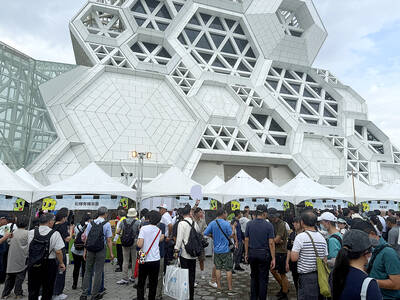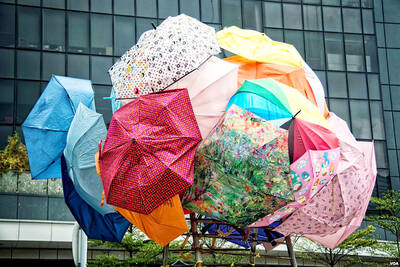Each year, the Novel Hall Dance series showcases choreographers and companies that are making waves in the art world with works that are both entertaining and thought-provoking.
Two choreographers who have been attracting attention since they were in their 20s are the focus of this year’s program. One is a new face for Taipei audiences, Israel-born, France-based Emanuel Gat, while the other is more familiar, Briton Akram Khan, who will be making his fourth appearance at Novel Hall.
While the backgrounds of the pair could not be more different, they have much in common: they are famed for their cross-cultural productions and both came to modern dance after years of training in another discipline. The 31-year-old Gat was studying to be a conductor at the Tel Aviv Academy before switching to choreography. Khan grew up studying traditional Indian Kathak dance. Both men are also exceptional dancers.
The series begins on May 14 with Gat’s six-year-old company — Emanuel Gat Dance — presenting three works: Winter Voyage, Silent Ballet and The Rite of Spring.
Elaine Huang (黃麗宇), Novel Hall’s public relations manager, said Cloud Gate Dance Theatre founder Lin Hwai-min (林懷民), who is artistic director for the dance series, selected the three pieces.
“In 2008, Emanuel Gat was invited to the Pina Bausch festival, and Cloud Gate was there too,” she said in a telephone interview on Tuesday. “Mr Lin saw the company and wanted them for the Novel series.”
Both Winter Voyage and The Rite of Spring premiered in the company’s first year and helped solidify Gat’s reputation as an innovative choreographer.
Igor Stravinsky’s 33-minute score has inspired and confounded dozens of choreographers since the 1918 premiere of Vaslav Nijinksy’s Le Sacre du Printemps. Just last year Taipei audiences saw multimedia artist and musician Klaus Obermaier’s 3D version. However, few choreographers have tried to pair Stravinsky with salsa and ballroom, as Gat has done in his creation for five dancers, which has won plaudits for its combination of physicality and intelligence.
The 14-minute long Winter Voyage is a duet by Gat and Roy Assaf to the lieder cycle of the same name by Franz Schubert.
Silent Dances, which premiered in July 2008, is silent in the sense that there is no music. Instead, Gat has orchestrated movements for the nine dancers that both emphasize the silence and to create a sound environment. It is dance stripped to the basics.
Khan, who last appeared in Taipei in September 2007 with Sidi Larbi Cherkaoui in the mesmerizing Zero Point, has also pared down his latest work to just five musicians and himself.
Huang said the Novel Hall staff couldn’t wait to see Khan’s show.
“I think most of the people at Novel are looking forward to seeing the pure, authentic Kathak pieces; it’s all in his [Khan’s] body. Gnosis is actually the second half of the show; the first half is two classic Kathak pieces. His previous three shows have been fusion pieces and so we all love to see him do classic pieces,” she said.
“He’s bringing five musicians: Japanese taiko drummer Yoshi [Sunahata], one cellist, a singer of traditional Indian music, a tabla player and a sarod [a stringed instrument] player,” she said.
Gnosis follows Khan’s trend in recent years to collaborate with artists both inside and out of the dance world: Cherkaoui, prima ballerina Sylvie Guillem, actress Juliette Binoche. This time it’s drummer-singer-dancer Sunahata.
The production was to have premiered last fall at Sadler’s Wells in London, but an accident in Paris a few weeks before left Khan with a hairline fracture in an arm and forced him to limit his dancing. Instead, the first full showing was in Abu Dhabi in February, and judging by Khan’s travel schedule for this month alone (Copenhagen, Macau, Birmingham, Paris, Beijing, Taipei and Sydney), he is back in full form.
Gnosis is based on one of the tales from the great Sanskrit epic poem the Mahabharata — the story of Queen Gandari, who blindfolds herself for life to follow her blind husband before dying in a forest fire. Sunahata portrays the queen.
Khan is an amazing performer, fluidly supple yet geometrically precise, often moving so fast he is just a blur, then breaking off to catch his breath and talk a bit to the audience.
For the past five years the Novel Hall Dance series has used a slogan that Lin came up with — “For your eyes, for your soul.” Both Gat and Khan’s shows promise to make good on that pledge.

Water management is one of the most powerful forces shaping modern Taiwan’s landscapes and politics. Many of Taiwan’s township and county boundaries are defined by watersheds. The current course of the mighty Jhuoshuei River (濁水溪) was largely established by Japanese embankment building during the 1918-1923 period. Taoyuan is dotted with ponds constructed by settlers from China during the Qing period. Countless local civic actions have been driven by opposition to water projects. Last week something like 2,600mm of rain fell on southern Taiwan in seven days, peaking at over 2,800mm in Duona (多納) in Kaohsiung’s Maolin District (茂林), according to

It’s Aug. 8, Father’s Day in Taiwan. I asked a Chinese chatbot a simple question: “How is Father’s Day celebrated in Taiwan and China?” The answer was as ideological as it was unexpected. The AI said Taiwan is “a region” (地區) and “a province of China” (中國的省份). It then adopted the collective pronoun “we” to praise the holiday in the voice of the “Chinese government,” saying Father’s Day aligns with “core socialist values” of the “Chinese nation.” The chatbot was DeepSeek, the fastest growing app ever to reach 100 million users (in seven days!) and one of the world’s most advanced and

The latest edition of the Japan-Taiwan Fruit Festival took place in Kaohsiung on July 26 and 27. During the weekend, the dockside in front of the iconic Music Center was full of food stalls, and a stage welcomed performers. After the French-themed festival earlier in the summer, this is another example of Kaohsiung’s efforts to make the city more international. The event was originally initiated by the Japan-Taiwan Exchange Association in 2022. The goal was “to commemorate [the association’s] 50th anniversary and further strengthen the longstanding friendship between Japan and Taiwan,” says Kaohsiung Director-General of International Affairs Chang Yen-ching (張硯卿). “The first two editions

It was Christmas Eve 2024 and 19-year-old Chloe Cheung was lying in bed at home in Leeds when she found out the Chinese authorities had put a bounty on her head. As she scrolled through Instagram looking at festive songs, a stream of messages from old school friends started coming into her phone. Look at the news, they told her. Media outlets across east Asia were reporting that Cheung, who had just finished her A-levels, had been declared a threat to national security by officials in Hong Kong. There was an offer of HK$1m (NT$3.81 million) to anyone who could assist